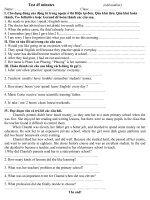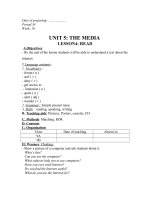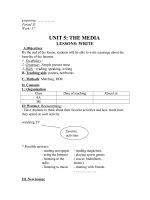TÀI LIỆU TIẾNG ANH VỀ VẢI DENIM - Types of Denim
Bạn đang xem bản rút gọn của tài liệu. Xem và tải ngay bản đầy đủ của tài liệu tại đây (3.73 MB, 25 trang )
DENIM
Name : MAZADUL HASAN SHESHIR
ID: 2010000400008
Batch: 13th Batch (Session 2009-2013)
Department: Wet Processing Technology
Email:
Blog: www. Textilelab.blogspot.com
Southeast University
Department of Textile Engineering
PREPARED BY
©right
Introduction :
Denim is a rugged cotton twill textile, in which the weft passes
under two or more warp threads. Denim is the most popular
pieces of clothing in the world. In 1969 a writer for American
Fabrics magazine declared, "Denim is one of the world's oldest
fabrics, yet it remains eternally young.“
Denim was invented in California by Levi Strauss in the 1850s.
Denim is designed most of the famous USA brand and 400
pieces thousand per month. Now a day’s 415 million pieces of
jeans/ Denim sold every year in USA alone and worldwide in
denim market is worth amount of 40 billion dollars.
Introduction :
Denim's popularity was also on the rise. It was stronger and
more expensive. Denim was made of one colored thread
and one white thread. The countries over 20 denim plants,
installed during the last five to six years, have the capacity
to produce 20 million gauge fabrics per month.
Denims are hard wearing, high density fabric with a higher
mass per unit area. At least 225 pair of denim jeans can be
made from one bale of cotton. Denim is made from 48% of
the world's cotton. Denim fabric was unique in its
connection with one color - blue.
Types of Denim :
Stretch denim Slub denim Printed Denim
Bull Denim Ring Denim Poly-Denim
Types of Denim
Stretch denim: Elastomeric yarn is used in weft.
Poly-Denim: Polyester yarn is used in weft.
Ring Denim: 7,9,12 count of yarn is used.
Bull Denim : A heavy weight denim weave (14oz. Plus)
Printed Denim : That has been printed with a pattern-a batik,
stripe or floral.
Slub denim: Slub yarn is used in warp or weft or in both(Cross
Hatch Denim).
Manufacturing Process:
Spinning:
The initial processes of denim manufacturing
consist of the regular activities of opening
and mixing or blending of cotton fibers.
Carding is done to remove any foreign
materials and the short fibers.
Drawing process produces a single,
uniform sliver from a number of carded
slivers.
Yarn is then spun through Open-End Spinning or Ring Spinning.
Quality criteria:
Minimum staple length – 2.7 cm
Proportion of short fibers(<less then 12 mm long)
:under 40%
Micronaire value – 4.0 to 4.5
Twist Factor – 4.5 to 5.0(for warp), 4.2(for weft)
Count range: Warp 50-90 tex & weft 75-120 tex.
low yarn hairiness
Yarn strength & uniformity.
Warp Preparation - Dyeing and Sizing Processes:
Warp yarns are indigo dyed and sized with the help of some
methods:
Indigo Rope dyeing: There are some stages in indigo rope
dyeing. They are: 1.Ball warping. 2.Dyeing. 3. drying.
4.Rebeaming. 5.beaming. 6.Sizing
Indigo sheet dyeing: Threads from several
back beams are combined to form a warp sheet
and dyed then sized on the same machine
Indigo loop dyeing: The yarn is dyed in a single
bath instead of several. The desired depth of colour
is attained by passing the yarn through the vat several times
then sized on the same machine.
Size recipe for 100 liters of liquor:
-8.00 Kg modified starch.
-4.00 kg acrylate size.
-0.2 kg textile wax.
-Size concentration: 8%
-Size temperature 850C.
-Squeezing pressure: approx.15 KN.
-Size pickup: 9% - 10%
Weaving & Desizing
The weaving process interlaces the
warp, which are the length-wise indigo
dyed yarn and the filling, which are white
in color. Airjet, Rapier, or a Projectile
weaving m/c used.
Weight range: (6 oz/yd2) to (14 oz/ yd2)
Finishing
The final woven fabric, wound on a cloth roll.
The woven Denim Fabrics then goes through various
finishing processes, such as singeing, washing,
brushing, drying.
Denim Fabric Treatments
There are many fabric treatments, and each treatment gives the denim a unique and fashionable look:
Stone-washed: In traditional washing process, volcanic rocks or pumice stones are added to the garments
during washing
Laser technology: It is a computer controlled process for denim fading
Spray techniques: This technique is based on spraying the chemicals or pigments to get different effect
Sandblasted: Denim is sprayed with sand or chemicals during the wash process to create a worn-out
appearance.
Denim bleaching: In this process, a strong oxidative bleaching agent such as sodium hypochlorite or
KMnO4 is added during the washing
Vintage/Dirty: Dirty denim is usually created with brown filler yarns.
Diversification of Denim
By using Slub/fancy Yarn.
By changing EPI & PPI.
By using different count.
Spandex(Lycra) can be used.
By applying different wash effect. (Stone, Enzyme,
Blech)
By applying different mechanical effect. (Rubbing,
brushing)
Prospect of Denim in Bangladesh:
Bangladesh Export of Denim Jeans to EU:
Bangladesh is a major exporter of denim jeans to EU.
Being low priced and with special and indefinite duty
free and quota free access under ‘Everything but arms’
initiative to EU, Bangladesh continues to dominate the
EU denim import business. Currently, it has about 19%
share of the denim jeans import market in EU 27
countries. Let’s have a look at the figures of imports of
denim from Bangladesh for the last 10 years.
Prospect of Denim in Bangladesh
Table: Imports of denim from Bangladesh for the last 10 years
Different denim factory in Bangladesh:
Sinha Denim Ltd.
Ha-Meem Denim Mills Ltd.
BEXIMCO
Royal Denim:
Zulekha Denims Ltd
Siatex
BIG X ENTERPRISES AND ASSOCIATE
BONAMI FASHION
Toptex Design Ltd.
Trendz Group etc
Some denim products by Bangladesh:
Common Defects of Denim Sewing in BANGLADESH:
1. STITCHES – NEEDLE CUTBROKENTING
Where the thread is being broken where one seam crosses another seam (ex: bartacks on
top of waistband stitching, seat seam on top of riser seam) resulting in stitch failure.
Where the thread is broken during stone-washing, sand blasting, hand sanding, etc. Broken
stitches must be repaired by restitching over the top of the stitch-line.
2. Broken Stitch – Abrasion:
Common Defects of Denim Sewing in BANGLADESH:
3. Broken Stitches: Chemical Degradation:
4. Unraveling Seams:
Where thread is being compromised by the chemicals used during laundering resulting
in loss or change of color and seam failure.
where either the stitch has been broken or a skipped stitch has occurred. This will
cause seam failure unless the seam is Re-stitched.
Common Defects of Denim Sewing in BANGLADESH:
5. Ropy Hem:
Where hem is not laying flat and is skewed in ROPY HEM appearance.
6. Ragged – Inconsistent Edge:
Where the edge of the seam is either extremely "ragged" or "rolls" inside the stitch
Common Defects of Denim Sewing in BANGLADESH:
7. Wavy Seams on Stretch Denim:
Where the seam does not lay flat and is wavy due to the fabric stretching as it was sewn or during
subsequent laundering and handling operation.
8. Twisted Legs:
Where the side seam twists around to the front of the pant and distorts the appearance of the jeans.
End use:
Men’s shirt
Bottom wear
Critical cargo
HI-FASHION DENIM Jeans
Wrinkle Free fabric
Laser finish
Dress Pants
Capri pants
denim skirts
Hats
Jackets
Overalls
Shirts
Booties & shoes
Shorts
Sofa covers
Bean bag chairs
Director-style chairs
Lampshades
College Bags
Travel Bags
Car Seat Covers
Denim Curtains
Denim Body Suit
Denim Face Mask etc









